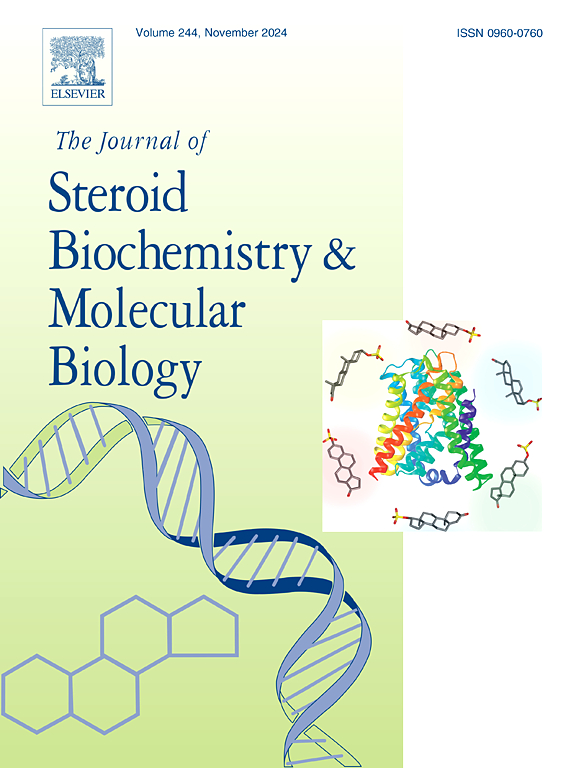FSH, LH, lipid and adipokines in Polycystic Ovary Syndrome: Clinical biochemistry insights for diagnosis and management
IF 2.5
2区 生物学
Q3 BIOCHEMISTRY & MOLECULAR BIOLOGY
Journal of Steroid Biochemistry and Molecular Biology
Pub Date : 2025-05-05
DOI:10.1016/j.jsbmb.2025.106773
引用次数: 0
Abstract
Polycystic Ovary Syndrome (PCOS) is a common endocrine syndrome characterized by hormonal imbalances, metabolic disturbances, and clinical symptoms. The pathophysiology of this syndrome involves disruptions in hormonal signaling, particularly changes in levels of luteinizing hormone (LH), and follicle-stimulating hormone (FSH) which can lead to anovulation and infertility. Additionally, insulin resistance and dysfunctional adipose tissue are other complicating factors of this condition. Biochemical markers such as FSH, LH, lipid profiles, and adipokines (like leptin and adiponectin) are crucial for diagnosing PCOS and assessing its severity. In PCOS patients, elevated LH levels relative to FSH are typically observed, and lipid abnormalities increase the risk of cardiovascular diseases. Diagnosing this syndrome usually requires comprehensive biochemical tests to confirm hyperandrogenism and insulin resistance. Management strategies include lifestyle modifications and pharmacological interventions aimed at correcting hormonal imbalances and dyslipidemia. Monitoring treatment outcomes through biochemical markers is essential for evaluating therapeutic efficacy. This review article examines the roles of FSH and LH hormones, lipids, and adipokines in the diagnosis and management of PCOS, emphasizing the importance of clinical biochemistry in improving diagnostic and treatment methods for this disorder. Furthermore, research into identifying emerging biomarkers for early diagnosis and new therapeutic targets is suggested.
多囊卵巢综合征中卵泡刺激素、黄体生成素、脂质和脂肪因子:诊断和治疗的临床生化见解
多囊卵巢综合征(PCOS)是一种常见的内分泌综合征,以激素失衡、代谢紊乱和临床症状为特征。该综合征的病理生理学包括激素信号的中断,特别是黄体生成素(LH)和卵泡刺激素(FSH)水平的变化,这可能导致无排卵和不孕。此外,胰岛素抵抗和功能失调的脂肪组织是这种情况的其他复杂因素。生化指标如FSH、LH、脂质谱和脂肪因子(如瘦素和脂联素)对于诊断多囊卵巢综合征和评估其严重程度至关重要。在多囊卵巢综合征患者中,通常观察到LH水平相对于FSH水平升高,脂质异常会增加心血管疾病的风险。诊断这种综合征通常需要全面的生化检查,以确认高雄激素症和胰岛素抵抗。管理策略包括改变生活方式和旨在纠正激素失衡和血脂异常的药物干预。通过生化指标监测治疗结果对评估治疗效果至关重要。本文综述了促卵泡刺激素和黄体生成素、脂质和脂肪因子在多囊卵巢综合征诊断和治疗中的作用,强调了临床生物化学对改善多囊卵巢综合征诊断和治疗方法的重要性。此外,建议研究识别新兴的生物标志物,用于早期诊断和新的治疗靶点。
本文章由计算机程序翻译,如有差异,请以英文原文为准。
求助全文
约1分钟内获得全文
求助全文
来源期刊
CiteScore
8.60
自引率
2.40%
发文量
113
审稿时长
46 days
期刊介绍:
The Journal of Steroid Biochemistry and Molecular Biology is devoted to new experimental and theoretical developments in areas related to steroids including vitamin D, lipids and their metabolomics. The Journal publishes a variety of contributions, including original articles, general and focused reviews, and rapid communications (brief articles of particular interest and clear novelty). Selected cutting-edge topics will be addressed in Special Issues managed by Guest Editors. Special Issues will contain both commissioned reviews and original research papers to provide comprehensive coverage of specific topics, and all submissions will undergo rigorous peer-review prior to publication.

 求助内容:
求助内容: 应助结果提醒方式:
应助结果提醒方式:


